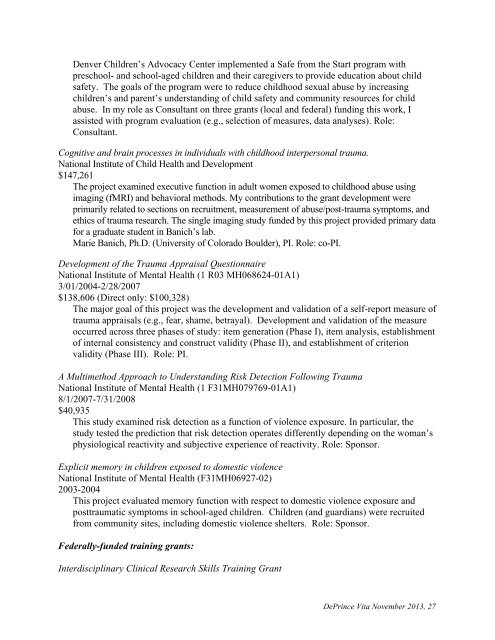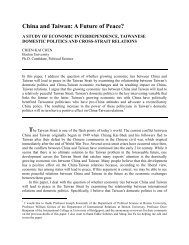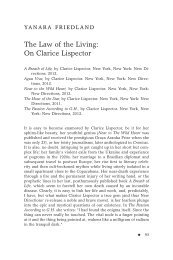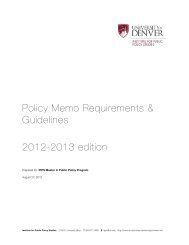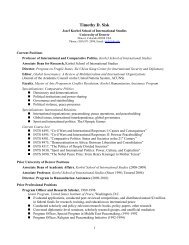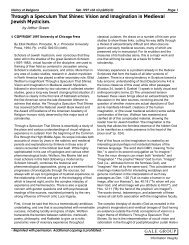here - University of Denver
here - University of Denver
here - University of Denver
Create successful ePaper yourself
Turn your PDF publications into a flip-book with our unique Google optimized e-Paper software.
<strong>Denver</strong> Children’s Advocacy Center implemented a Safe from the Start program with<br />
preschool- and school-aged children and their caregivers to provide education about child<br />
safety. The goals <strong>of</strong> the program were to reduce childhood sexual abuse by increasing<br />
children’s and parent’s understanding <strong>of</strong> child safety and community resources for child<br />
abuse. In my role as Consultant on three grants (local and federal) funding this work, I<br />
assisted with program evaluation (e.g., selection <strong>of</strong> measures, data analyses). Role:<br />
Consultant.<br />
Cognitive and brain processes in individuals with childhood interpersonal trauma.<br />
National Institute <strong>of</strong> Child Health and Development<br />
$147,261<br />
The project examined executive function in adult women exposed to childhood abuse using<br />
imaging (fMRI) and behavioral methods. My contributions to the grant development were<br />
primarily related to sections on recruitment, measurement <strong>of</strong> abuse/post-trauma symptoms, and<br />
ethics <strong>of</strong> trauma research. The single imaging study funded by this project provided primary data<br />
for a graduate student in Banich’s lab.<br />
Marie Banich, Ph.D. (<strong>University</strong> <strong>of</strong> Colorado Boulder), PI. Role: co-PI.<br />
Development <strong>of</strong> the Trauma Appraisal Questionnaire<br />
National Institute <strong>of</strong> Mental Health (1 R03 MH068624-01A1)<br />
3/01/2004-2/28/2007<br />
$138,606 (Direct only: $100,328)<br />
The major goal <strong>of</strong> this project was the development and validation <strong>of</strong> a self-report measure <strong>of</strong><br />
trauma appraisals (e.g., fear, shame, betrayal). Development and validation <strong>of</strong> the measure<br />
occurred across three phases <strong>of</strong> study: item generation (Phase I), item analysis, establishment<br />
<strong>of</strong> internal consistency and construct validity (Phase II), and establishment <strong>of</strong> criterion<br />
validity (Phase III). Role: PI.<br />
A Multimethod Approach to Understanding Risk Detection Following Trauma<br />
National Institute <strong>of</strong> Mental Health (1 F31MH079769-01A1)<br />
8/1/2007-7/31/2008<br />
$40,935<br />
This study examined risk detection as a function <strong>of</strong> violence exposure. In particular, the<br />
study tested the prediction that risk detection operates differently depending on the woman’s<br />
physiological reactivity and subjective experience <strong>of</strong> reactivity. Role: Sponsor.<br />
Explicit memory in children exposed to domestic violence<br />
National Institute <strong>of</strong> Mental Health (F31MH06927-02)<br />
2003-2004<br />
This project evaluated memory function with respect to domestic violence exposure and<br />
posttraumatic symptoms in school-aged children. Children (and guardians) were recruited<br />
from community sites, including domestic violence shelters. Role: Sponsor.<br />
Federally-funded training grants:<br />
Interdisciplinary Clinical Research Skills Training Grant<br />
DePrince Vita November 2013, 27


